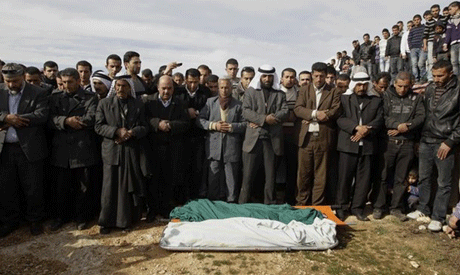
Palestinians attend the funeral of two 12-year-old boys in the West Bank village of Sier, near Hebron, March 7, 2012. (Photo: Reuters)
The UN Special Committee on Israeli Practices in the Occupied Arab Territories held a press conference in Cairo on Thursday to announce the conclusions of its annual field mission. The committee's findings, which will be delivered to the UN General Assembly in November, were based on interviews with Palestinian refugees and officials in Amman, Cairo and the Gaza Strip.
The committee's report described the testimonies it heard as "alarming," especially those pertaining to Israel's detention and mistreatment of Palestinian children.
"The mistreatment of Palestinian children starts the moment they are detained" by Israeli authorities, Palitha Kohana, committee chairman and Sri Lanka’s permanent representative to the UN.
The committee report states that Palestinian children's homes are often surrounded by Israeli soldiers late at night. Soldiers fire sound grenades into their houses, break down their doors and fire live ammunition. Judicial warrants, the report noted, are never produced.
Children detained by Israeli authorities are tightly bound, blindfolded and forced into the backs of military vehicles. Their parents are not allowed to accompany them. They are, as a matter of course, insulted, intimidated and at times physically abused by Israeli authorities.
According to the committee, witnesses said the detention and transfer of children can last for hours, while they are denied any legal representation.
Palestinian children are regularly told by Israeli authorities that, if they confess to their "crimes," they will be taken home; otherwise, they are threatened with torture. In some cases, Israeli soldiers resorted to burning children with hot irons, the committee reported.
Detained Palestinian children are forced to sign "confessions" in Hebrew, the committee found, a language many of them don’t understand. In 63 per cent of the cases involving detained Palestinian children, according to testimony heard by the committee, Israeli interrogators try to pressure them into becoming informants and spying on their own communities.
Committee members said they had met with Mahmoud Sarsak, a member of the Palestinian national football team. Sarsak was recently released by Israeli authorities following a three-month hunger strike to protest against the Israeli practice of "administrative detention."
"Mahmoud's case illustrates the experience suffered by thousands of detained Palestinians," Kohana said.
The committee went on to express "deep concern" over the demolition of Palestinian homes by Israeli authorities. Witnesses asserted that home demolitions had increased at an alarming rate over the last three years, with 330 homes and other structures demolished in 2012 alone.
Since 1967, the report noted, some 26,000 Palestinian structures had been levelled by Israeli occupation authorities.
The committee found that home demolitions aimed chiefly at cleansing the land of its Palestinian population. This year alone, over 500 Palestinians – more than half of them children – had been rendered homeless by Israeli demolitions, the report noted.
The committee also pointed to violent attacks against Palestinian children by Israeli residents of Jewish-only "settlements." An Israeli non-governmental organisation reported 642 cases of settler violence since 2005, some 90 per cent of which were thrown out of court owing to a "lack of evidence."
When asked about the impact of the report on the future of the so-called "peace process" between the Tel Aviv regime and the Palestinian Authority, Kohana told Ahram Online that he hoped such reports of the deteriorating humanitarian situation in the occupied territories might force negotiators to pressure Israel into changing its "oppressive policies."
"Israel needs to change its attitude towards the peaceful, unarmed Palestinians," he said. "There are many other ways to safeguard its national security interests."
When asked about what kind of response could be expected of the international community to the host of reported Israeli rights violations, Kohana, briefly taken aback, said merely: "I have no idea."
The Special Committee was established by the UN General Assembly in 1968 to investigate Israeli practices affecting the human rights of the Arab inhabitants of the territories occupied by the self-proclaimed Jewish state the year before. Committee members are drawn from Sri Lanka (Chairman), Malaysia and Senegal.
Short link: